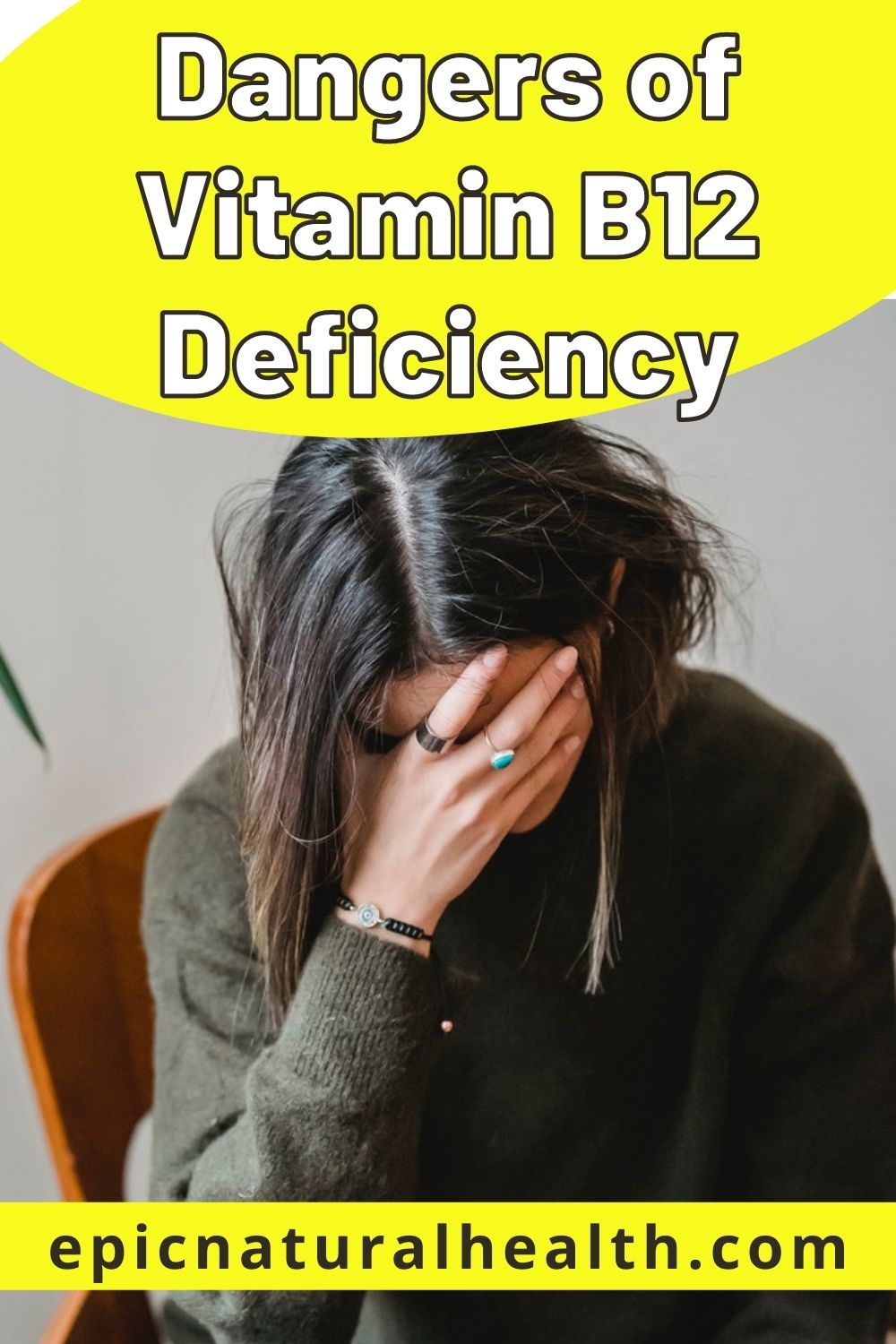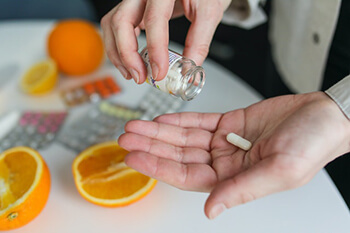Vitamin B12 isn't one of the first nutrients you think of. Calcium, vitamin C, vitamin A, and vitamin D all take the forefront - but ignoring vitamin D can have unpleasant and even dangerous consequences.
Stay tuned to learn about vitamin B12 deficiency in detail, including how it's caused, the symptoms of vitamin B12 deficiency, and how to resolve a deficiency in this vitamin.
What is Vitamin B12?
Vitamin B12, also known as cobalamin, is a B vitamin that the body needs for a number of functions. Most importantly, vitamin B12 is needed to produce red blood cells. Vitamin B12 also enables the nerves to function healthily, boosts cognitive function, and helps the body make DNA.
Additionally, B12 allows the body to metabolize fat and protein effectively.
When someone has a vitamin B12 deficiency, their body will still be able to carry out these processes, but with far less effectiveness. This can lead to significant problems.
Where is Vitamin B12 Found?

Vitamin B12 is found predominantly in animal foods, including:
- Fish
- Meat
- Poultry
- Eggs
- Dairy products
Vitamin B12 can also be found in fortified foods. Nutritional yeast, some yogurts, tempeh, some breakfast cereals, and plant-based milk are examples of foods that are fortified with vitamin B12.
There are a couple of plant-based foods that vitamin B12 occurs in naturally, including spinach and green peas.
Who can Get a Vitamin B12 Deficiency?

Anyone can become deficient in vitamin B12. If you don't eat a lot of meat or dairy, you're likely to have a vitamin B12 deficiency.
The average adult needs at least 2.4 mcg of vitamin B12 on a daily basis. Vitamin B12, like most vitamins, can't be absorbed by the body naturally, so we have to obtain it through what we eat.
It's a myth that all vegetarians and vegans are vitamin B12 deficient. However, because vegetarians and vegans don't eat meat, they're more likely to be B12 deficient. Most people who follow a plant-based diet are clued up on this, and make sure they get their B12 from fortified products, like milk and cereals, or from supplements.
A vitamin B12 deficiency is also more common in older adults, although again, being an older person doesn't guarantee that you'll have a vitamin B12 deficiency.
People who have had weight-loss surgery are more at risk of vitamin B12 deficiency because the surgery prevents them from being able to absorb the vitamin.
Several other conditions and situations can make you more likely to be deficient in B12, including:
- Atrophic gastritis, or a thinning of the stomach lining
- Pernicious anemia, making it difficult for the body to absorb B12
- Celiac disease and Chron'sdisease, and bacterial or parasitic growth in the small intestine
- Misuse of alcohol or heavy drinking
- Autoimmune disorders like lupus and Graves' disease
Medications that interfere with B12 absorption, like proton pump inhibitors (a type of heartburn medication) and some types of diabetes medicines
Signs of a Vitamin B12 Deficiency
Vitamin B12 deficiencies result in a variety of symptoms, which often makes it difficult to know for sure whether you're deficient in this vitamin or your symptoms relate to another health problem. Typically, symptoms of a vitamin B12 deficiency appear slowly, gradually worsening over time.
If you're not getting enough vitamin B12, you may experience one or several of the following symptoms:
- Yellow-tinged skin
- Mouth ulcers
- A red or swollen tongue
- Depression
- Irritability
- Pins and needles
- Disturbed vision
- Cognitive function problems
- Changes in how you walk
One of the biggest effects of a vitamin B12 deficiency is anemia caused by a reduced production of healthy circulating blood cells. This is known as vitamin B12 deficiency anemia.
This type of deficiency anemia causes the red blood cells to develop irregularly. In a person with B12 anemia, red blood cells are bigger and more oval-shaped than healthy red blood cells. As a result, the red blood cells can't provide a good supply of oxygen to the body, causing fatigue, weakness, and other complications.

Vitamin B12 deficiency anemia and has its own unique symptoms relating to a lack of oxygen, including:
- Weakness
- Fast heart rate
- Weight loss
- Fatigue
- Decreased appetite
- Nausea
- Tingling or numbness in the hands and feet
- Irritability
- Pale skin
- Diarrhea
It's no guarantee that you'll get vitamin B12 deficiency anemia alongside a standard B12 deficiency, and you can have all the symptoms of a B12 deficiency without the deficiency anemia symptoms. However, vitamin B12 deficiency anemia is a likely outcome in people who become more and more deficient over time.
Vitamin B12 deficiency is difficult to diagnose by assessing symptoms alone. In most cases, a doctor will arrange for a number of blood tests, including a complete blood count, to check that a person's hemoglobin and red blood cell counts are normal.

How to Treat Vitamin B 12 Deficiency
Thankfully, treating a vitamin B12 deficiency is usually easy, and in most cases, you'll be able to treat the deficiency without medications at home.
There's no need to visit a doctor unless you're concerned about something that doesn't feel right. Most cases of vitamin B12 deficiency don't require monitoring by a doctor, unless a person is very deficient or has B12 deficiency anemia.
Here are the best ways to treat a vitamin B 12 deficiency:
1. Eat More Vitamin B12 Foods

In cases where vitamin B12 is caused by a lack of animal products, the solution is simple: introduce more animal products into your diet.
If you're eating on a budget or you're following a healthy diet, it can be easy to reduce your intake of animal products without knowing. Aim to have at least one animal protein in every meal.
Vegetarians and vegans with a vitamin B 12 deficiency don't have to start eating animal products again. There are plenty of B12 fortified foods existing today that people following a plant-based diet can eat to ensure their B12 levels are high enough.
Get into the habit of checking nutrition labels when you're shopping to learn how much vitamin B12 products contain. You'll be able to make the smartest choices to ensure you're eating as much B 12 as you can.
2. Supplement with B 12

If you're still concerned that you're not getting enough vitamin B12 from your foods, you can use a supplement. Doctors often prescribe vitamin B12 supplements to people who can absorb the vitamin, but aren't eating enough sources of vitamin B12 in their diet.
Vitamin B 12 dietary supplements come in a number of forms, but tablets are the most popular choice. Taking a vitamin B12 tablet once per day is an easy way to make sure you're getting enough of this vitamin to stay healthy. If you can't get enough B12 from your diet, you may need to take the supplements for life.
Of course, eating B 12 foods or fortified foods is still the best way to obtain this vitamin, and it's best not to rely on supplementation alone. However, vitamin B12 dietary supplements are a good option for vegetarians and vegans, who are unlikely to get as much of the nutrient from fortified foods alone.
It's important to find high-quality B12 supplements. Cheapest typically isn't best in this case. Buy supplements from pharmacies or health stores rather than supermarkets or discount stores. If you're buying online, read and compare customer reviews to see which supplements are best.
3. Vitamin B 12 Injections
In some cases, a vitamin B 12 deficiency is caused by malabsorption - the body's inability to absorb vitamin B 12. Even eating a diet rich in vitamin B12 won't be enough to give your body what it needs if it can't absorb the vitamin. People with celiac disease are most likely to have problems absorbing vitamin B12.
The usual treatment for malabsorption is injection, bypassing the digestive system and allowing the body to absorb the vitamin through the muscles. To begin with, injections may be required every two weeks to build up the body's vitamin B12 stores. After this period, monthly injections are required to ensure the body's vitamin B12 levels are consistent.
Vitamin B 12 injections are also provided to people who have had neurological symptoms of vitamin B12 deficiency, like tingling and numbness in the hands and feet. In this case, injections will usually be provided every two months.
4. Folic Acid Tablets
If you have vitamin B12 deficiency anemia, you can use folic acid supplements or tablets to increase your folate levels.
You can also increase your dietary intake - and the good news for vegetarians and vegans is that a lot of plant-based foods contain folate. Good sources of folate include broccoli, brussels sprouts, peas, asparagus, brown rice, and chickpeas.
Generally, you'll need to take folic acid tablets for a minimum of four months, while also boosting your vitamin B 12 intake, to treat B12 deficiency anemia.
If you don't effectively treat the underlying cause of the anemia, you may end up having to take folic acid supplements for much longer. That's why it's important to treat a deficiency in B12 alongside deficiency anemia.
When to See a Doctor

You know your body better than anyone else, and if something doesn't feel right, it's best to get it checked with a doctor.
If you're experiencing a range of symptoms related to a deficiency in B 12 or folate deficiency anemia, up your vitamin B 12 dietary intake. This should resolve the problem naturally, with no need for medical intervention. If, after a couple of weeks, your symptoms persist, you can arrange to see your doctor.
Even if you think you can absorb vitamin B 12, if you're concerned about anything, you can visit your doctor for a check-up and ask for advice while you're there.
Remember, your symptoms may not be related to a vitamin B 12 deficiency. Because they're so wide-ranging, the symptoms of a B 12 deficiency are also the symptoms of many other issues and imbalances in the body. It's best to share your concerns with a doctor, who can arrange for blood tests and other means of diagnosis based on what you tell them.
Takeaway
A B12 deficiency can be dangerous, and it's important to make sure you're getting enough B12 if you have any reason to believe that you're not.
Track what you're eating with a meal plan if necessary. Work out how you could include more B12 in your diet. For most people, this should be easy, because B12 is found in a lot of staple animal food sources, as well as fortified foods. If in doubt, buy high-quality B12 supplements and take them daily, or book an appointment with your doctor.
In most cases, recovering from B12 deficiency is easy, so if you think you're deficient in the nutrient, don't panic - you can resolve the problem within a few months.

